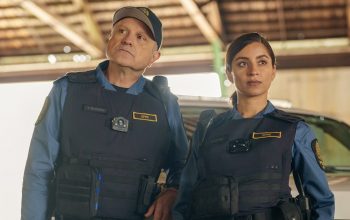Personal Space, a new science fiction digital series currently crowdfunding, stars some Televixen favorites including Nicki Clyne, Tahmoh Penikett, and Richard Hatch of Battlestar Galactica, Tim Russ of Star Trek: Voyager, and Kurt Yaeger of Sons of Anarchy, and it’s got a most intriguing premise: “Unbeknownst to the crew of a generation ship, their therapy sessions are being broadcast on Earth as a reality show.” As the show begins, the second shift crew, which has been asleep for 25 years, has woken up and is supposed to take command – but everything doesn’t go according to plan. The cast and concept here both caught our interest, so we spoke with co-creator (along with Tom Pike and Zack Wallnau), writer, and transmedia producer Dana Luery Shaw about the project.
I love the idea of using a vlog-style format to do a space show that doesn’t need a ton of special effects, but beyond that practical reason, how did this format affect your storytelling? In the Kickstarter video, Pike mentions wanting to make character-driven sci fi — did the very personal nature of therapy sessions help that?
I’d say that the nature of a vlog-style format has to keep things character-driven. How can you keep people watching a static camera angle if it’s not focused on engaging characters? It has also made the nature of depicting conflict interesting to deal with, because we generally don’t show direct action or confrontation between characters. We show befores and we show afters. Causes and consequences.
On the other hand: The format limits the extent of interaction with each other the characters would plausibly have, assuming these are mostly individual sessions. How did you think about or deal with that?
We’ve built the structure of the episodes and of the series to make sure that even if the characters aren’t on screen together, it feels like they’re still interacting. Like Character A’s anger at Character B can immediately carry over into Character B’s amused “Who, me?” Each episode works to tell a single story, and the bits and pieces of the therapy sessions we show go towards supporting that story. AMI, the therapy computer, helps to keep the scenes grounded by acting as a constant for all of the characters.
The other interesting thing about your format is that the characters’ footage is being used for a reality TV show without their knowledge. That’s a great way to deal with the “Why would these people put this online?” issue many vlog-style shows run into. Are you a fan of reality TV yourself? Love or hate it, it’s a huge force in our culture.
Generally speaking, I’m not a huge fan of reality TV. I don’t like to watch people to laugh at them, and I’m not a huge fan of producer-generated conflict between like … real people, who have lives after the show. And that’s something that, especially for a reality show set in space, would be detrimental to the lives and mission of the people affected. That’s sort of what we wanted to show — the lasting effects of meddling with people’s lives in that way. That said, I absolutely and unabashedly love The Quest, which is just such a delight and I wish every day that we, humanity, will prove ourselves worthy of a Season 2. I can’t even call it a guilty pleasure because I’m not guilty about it. I just love it.
What are some of the challenges your characters face when they wake up in 2016? The world has changed a lot in the past 25 years.
Tom [Pike] would want me to say that the biggest challenge they face is how uncool perms have become. I’d say that their biggest challenges are trying to learn how to work together in what is quickly becoming a hostile work environment. We’ve all been there, right? The difference is that most of us don’t have to spend 25 years with our jerk coworkers, and ONLY our jerk coworkers. Beyond that, honestly, everything on Earth is so far away that it doesn’t have much of an effect on them! What does it mean to wake up to a world where the USSR fell and the president is black? Surprisingly little when your world consists of a tin can flying through space.
Having the crew stay “awake” in shifts for a long journey makes total sense, but I’d never really thought about how people who started out as similarly aged colleagues would end up in different generations. Do they have a hard time adjusting to this?
In an ideal world, the crew wouldn’t have to spend much time adjusting. The earlier shift would go to sleep, and the later shift would take over. That’s how it’s supposed to go, anyway. But with First Shift Commander Robert King staying awake … yeah, it’s hard for him to leave his life in the hands of these kids who woke up straight out of 1991, even if they were once people he trusted. Age can be weird.
As you say, your plot deals with one commander, played by Richard Hatch, resisting handing over his power to his successor, played by Nicki Clyne. How does the fact that this is an older man questioning the professional legitimacy of a younger woman inform this dynamic?
Ha. So we technically wrote and cast every role for the crew of the [spaceship] Overture, gender-blind. We would cast whomever was best for the role. We saw women read for King. (We didn’t see men read for Gartner [Clyne’s role].) But from the beginning, when we were pitching this show, we showed a picture of a female Gartner and a male King. The dynamic is one that so many women are familiar with, where their own professional life is stymied by older men (and women) who don’t think they’re ready for the job or who don’t believe that they’re professional enough. I will say that, as the writers, we understand where King is coming from and things on his end may not all be as they seem. I genuinely believe that he would have a similar, if slightly more muted, response to a young man to whom he was supposed to relinquish his command. But that’s not the most interesting version of the story to tell, now is it?
Ooh, can’t wait to see more of both sides of that conflict. Now, in addition to being a writer on the show, you’re the transmedia producer. I checked out a bit of the miniseries prequel (in the form of a kids’ science show), and it’s very fun. Can you tease any other transmedia elements you’re planning? Are there going to be opportunities for the audience to interact with the characters?
We do have other transmedia elements, including a very tiny ARG [alternate reality game] that we’ll be coming out with in the last week of the campaign! As far as the actual show goes, there will be opportunities to interact with characters, but not the ones aboard Overture — it takes them a month just to receive Earth transmissions, how could they possibly react in anything close to real time? But never fear. We have some reality show hosts, after all, whose main job is manning their social media! Our transmedia is focused mostly on stuff that’s happening on Earth (we’ve actually been referring to our transmedia as our “planetside” efforts) in conjunction with and in response to the main show. That means you’ll be seeing and interacting with a much wider world than just the five characters awake aboard the ship.
Thanks for giving us the scoop, Dana! Can’t wait to see how this show progresses.
To learn more about Personal Space, check out their website and Kickstarter page!
(Image courtesy of Personal Space.)


